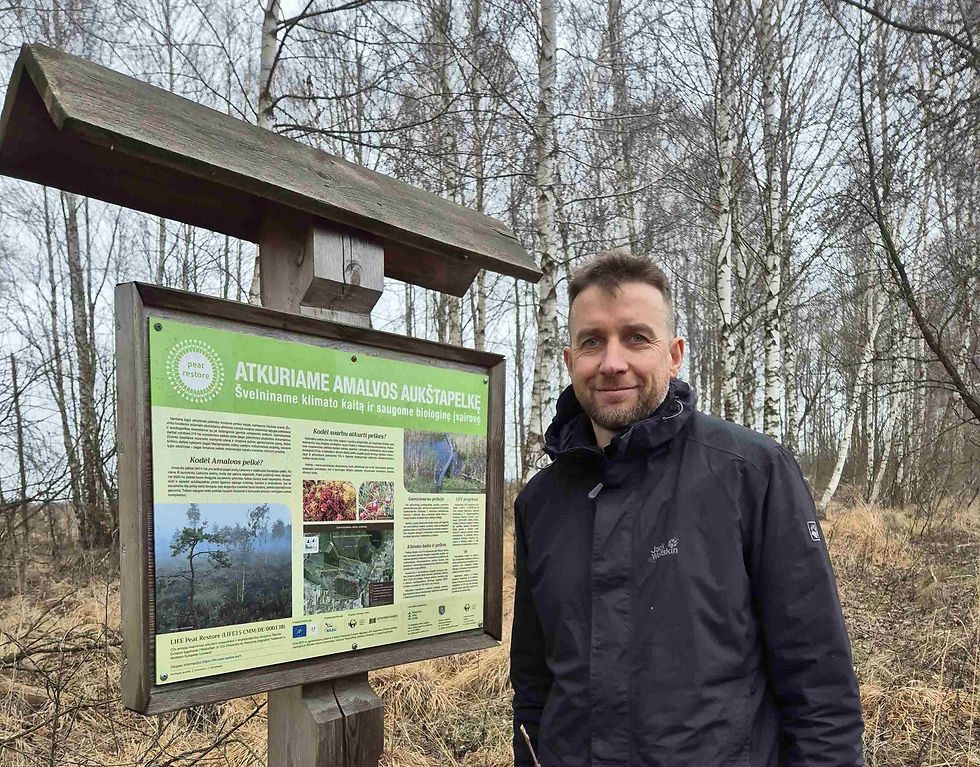16 million in the Lithuanian Economic Recovery and Resilience Building Plan. for the restoration of
- Jan 24, 2022
- 3 min read
Updated: Jan 17, 2023

16 million in the Lithuanian Economic Recovery and Resilience Building Plan. It is planned to allocate 8,000 hectares for the restoration of drained peatlands. The aim is to reduce greenhouse gas (GHG) emissions from peatlands used in agriculture. By using the investment measure provided for in the plan, the owners of such lands will be able to contribute to the mitigation of climate change and reduce the damage of peatland drainage to nature.
The €2.2 billion Lithuania's Economic Recovery and Resilience Plan "New Generation Lithuania", sent by the Lithuanian government to the European Commission last week, focuses on the restoration of peatlands used for agriculture. Restoration of 8 000 ha of drained peatlands (peat soils) by 2026 at a cost of €16 million is planned. Climate-smart farming will be promoted in the restored areas. This will not only contribute to climate change mitigation, but also to the protection of biodiversity, the restoration of sustainable and viable ecosystems, and the improvement of water quality. This investment measure is included in the Plan alongside other important measures for green transformation, digital transformation, health and social protection, education, science and innovation.
Farmers working in drained peatlands and municipalities supervising state land will be eligible for support. In particular, support will be provided to farmers in the regions and areas most affected by intensive agriculture.
Support will be provided to compensate the costs of wetland restoration: assessment of water level restoration possibilities, preparation of technical design, reconstruction of drainage systems, installation of dams, locks, removal of woody vegetation, other landscaping works (removal of stones, stumps, leveling). Restored wet wetland ecosystems should be maintained and could be used for hay production, grazing or cranberry and other berry growing. The success of wetland restoration will be judged on whether native plant species and plant communities have begun to grow in the wetland. The maintenance of restored wetlands should be further supported under the measures still planned for Lithuanian agriculture and rural development in 2023–2027. strategic plan.
Nerijus Zableckis, Director of the Wetlands Restoration and Protection Fund, points out that "the importance of wetland restoration in mitigating climate change is still underestimated in Lithuania. Although the planned area to be restored is not large, the fact that change for the measure ". Mr Zableckis hopes that this measure will be effective, will help change the attitude of land managers towards the natural importance of wetlands, and thus will help to preserve more wetlands (peatlands) in the future and will make a significant contribution to climate change mitigation.
The Minister of Agriculture Kęstutis Navickas notes that the peat generation restoration measure envisaged in the New Generation Lithuania Plan is primarily beneficial for farmers, as it would reduce the country's agricultural GHG emissions, which is one of the highlights of the European green exchange rate policy. "Commitments to climate change mitigation in agriculture are growing, but we will not be able to avoid some of the emissions, for example in livestock. It is therefore necessary to look for other solutions to achieve emission neutrality. Restoring carbon-rich ecosystems, in this case drained peatlands, is one of the key ways in which the sector can make a significant contribution to meeting its climate targets by increasing GHG absorption, while improving natural conditions and reducing pollution and creating new opportunities for sustainable farming. Minister.
After the restoration of the hydrological regime in Lithuania, 6 percent. up to 50% of the drained soils used in agriculture can be used. reduce agricultural GHG emissions. The measure was prepared using the international practice of wetland ecosystem restoration, the experience of non-governmental organizations in the implementation of wetland restoration projects. Until now, the country has focused on the restoration of drained and overgrown protected wetlands. Agricultural peatlands are subject to other requirements of legal acts, including the redevelopment of drainage systems and obtaining building permits. It is hoped that the support provided to farmers in the New Generation Lithuania Plan will encourage them to contribute to the restoration of ecosystems and climate-friendly farming in wetlands.




Comments